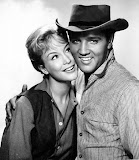1. Born Barbara Jean Morehead in 1931, she was using her stepfather's last name, Huffman, as a young actress in Hollywood. In her autobiography, she writes that her future agent, Wilt Melnick, didn't like her last name. He told her: "The name Barbara Huffman sounds like a doctor. Change it and I'll represent you." When she agreed, Melnick added: "You seem kinda innocent, so let's call you Eden, like the garden."
 |
| A publicity still with Elvis. |
2. Barbara Eden was a contract player for 20th Century-Fox in the late 1950s and early 1960s. She started out with small roles in films like
Will Success Spoil Rock Hunter? and
The Wayward Girl (both 1957), but quickly graduated to larger parts. She was cast opposite Elvis in
Flaming Star (1960), played a female naval officer in Irwin Allen's
Voyage to the Bottom of the Sea (1961), and worked with Allen again in
Five Weeks in a Balloon (1962). One of her co-stars in
Voyage to the Bottom of the Sea was her then-husband Michael Ansara.
3. On the day that
I Dream of Jeannie was sold to NBC, Barbara Eden found out she and Michael Ansara were pregnant. When she told series creator Sidney Sheldon, she thought she would replaced as Jeannie. However, Sheldon rushed the series into production. Eden later told
People Magazine: "We did the first 13 shows with me pregnant. I was a walking tent. I had so many gauzy things hanging down. It was one of the happiest times of my life."
4. Ironically, I Dream of Jeannie wasn't Barbara Eden's first encounter with a genie. In 1964, she starred opposite Tony Randall in The Brass Bottle, in which Tony's character buys an antique brass bottle that contains a genie--only this genie is played by Burl Ives!
5. When I Dream of Jeannie was cancelled after five seasons and 139 episodes, Barbara Eden starred in a pilot for her own series. In the The Barbara Eden Show, she played the head writer of a hit TV soap, who juggled life at work and home. Despite co-stars like Pat Morita and Joe Flynn, the pilot failed to result in a regular series.
6. Still, Barbara Eden continued to be in great demand as a TV series guest star and lead actress in made-for-TV and theatrical films. In 1978, she starred in a movie based on Jeannie C. Riley's 1968 hit country song "Harper Valley PTA." Shot on a modest budget, the film did solid business and three years later, Sherwood Schwartz adapted it as a TV sitcom starring Barbara Eden. The series, which also starred Fannie Flagg and George Gobel, lasted for two season and fifteen episodes.
7. In addition to starring on TV and in movies, Barbara Eden has appeared in numerous stage productions (e.g.,
The Sound of Music,
Woman of the Year, South Pacific), recorded an album called
Miss Barbara Eden (1967), and headlined resorts in Las Vegas. She has performed the play
Love Letters on tour with numerous male stars, such as Barry Bostwick, Hal Linden, and her
Jeannie co-star Larry Hagman. She will turn 91 in 2022.


















